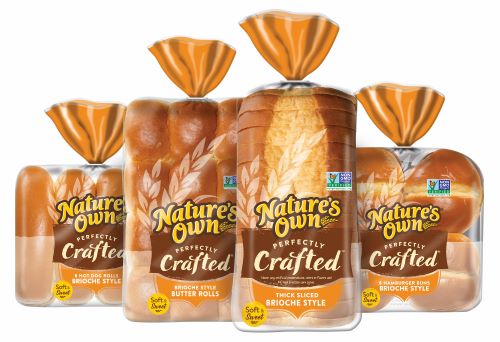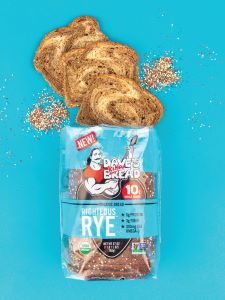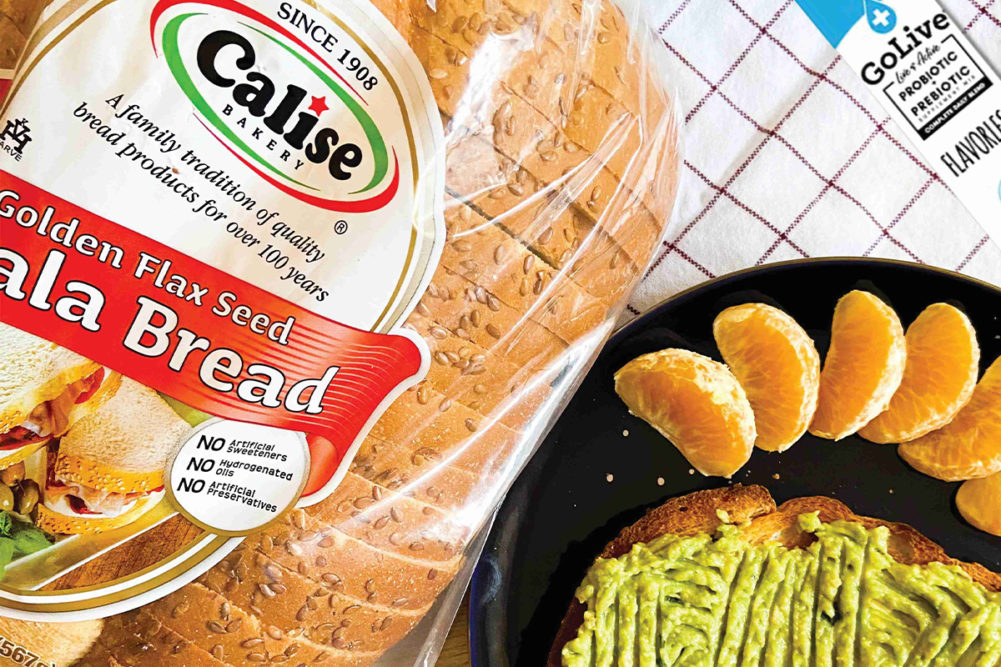KANSAS CITY — Even as bread sales retreated following a pandemic fueled surge in 2020-21, new product introductions stepped up significantly over the past year. While approaches differed widely in innovation strategies in recent months, health and wellness and indulgence stood out as significant themes.
Reflecting the continued erosion of market share commanded by private label bread, new product introductions were heavily centered within companies’ premium and super premium bread categories.
Dollar sales of bread in the 52 weeks ended Feb. 20 were $9.05 billion, down 2.5% from a year earlier, but up 9% compared with two years ago and up 8.1% from three years ago, according to IRI, a Chicago-based market research firm. The data cover grocery, drug, mass market, convenience, military and select club and dollar retailers.
Unit sales fell even more steeply in the 52 weeks ended Feb. 20, 2022 — down 8.3%, at 3.22 billion. Unit sales were down 2.6% versus the same period two years ago and down 4.7% compared with three years ago.
Dollar sales for the year among leading vendors were down 0.9% at Grupo Bimbo SAB de CV; down 2.9% at Flowers Foods, Inc.; and down 6.1% at Campbell Soup Co.
The only consistent thread between the past two years was private label. Dollar sales of private label fell 6.6% in the 52 weeks ended Feb. 20, 2022, and 5% in the 52 weeks ended Jan. 24, 2021.
Rather than focusing on the ups and downs of the bread market driven by external forces, notably the pandemic, Flowers Foods, Thomasville, Ga., the nation’s second largest baking company, has been steadily stepping up innovation in recent years. Products introduced by Flowers just before the pandemic and during 2020 have performed well, said Brent Bradshaw, senior vice president of core brands. Nature’s Own Perfectly Crafted Brioche Style was unveiled in 2019.
“It is doing very well and continuing to grow year after year,” he said. “Following the loaf’s success, we expanded the Nature’s Own Perfectly Crafted Brioche Style line to include buns, which have exceeded our initial expectations and continue to do so. These achievements are in large part the result of consumer insights and consumer-led innovation.”

Building on that success, Flowers in 2020 introduced Brioche Style Butter Rolls, which Mr. Bradshaw described as “extremely versatile” in that they are suitable for breakfast, lunch, dinner or snacking.
More generally, he called the Brioche Style line a “shining star” for the Nature’s Own brand and a strong complement to the original Perfectly Crafted loaves, which were introduced in white and multi-grain varieties.
In 2021, the Perfectly Crafted line was expanded with the launch of a rye variety nationwide.
“Consumers have responded well, and some called in personally to thank us for bringing this product to market.”
Innovation under the Dave’s Killer Bread brand most recently has been focused on adjacencies. The company currently is offering snack bars under the Dave’s Killer Bread brand in test markets. Closer to its bread roots, Flowers in 2020 launched Dave’s Killer Bread hamburger buns. Don Letchinger, senior vice president, growth brands at Flowers, called the hamburger bun introduction “the most successful product launch under the DKB brand since its inception in 2005.”
In addition to the strong sales of the DKB buns, Mr. Letchinger said the launch has drawn new consumers to the Dave’s Killer Bread brand.
“Over 60% of our hamburger bun sales come from new buyers,” Mr. Letchinger said. “Moreover, our consumers (whom we affectionately call Breadheads) responded extremely well to the product, telling us on social media how much they love the buns and asking for more new items from the brand.”

A rye variety — Righteous Rye — also was introduced by Dave’s Killer Bread in 2021. Mr. Letchinger called the products “DKB’s take on a traditional rye bread.”
“Our fans, including our sales team and retail partners, told us they desire a traditional rye bread done the ‘DKB’ way,” he said. “After studying popular rye breads in the category, we came up with our own unique spin on a rye loaf that would offer the killer taste and power-packed organic nutrition consumers expect from DKB. “
With its aggressive pace of introductions, Flowers in some ways has taken a contrarian approach toward innovation over the past two years. Many factors precipitated companies to dial back innovation during this period, including a perceived shift toward traditional products, powerfully evident in the first months of the pandemic; product shortages triggered by the sudden jump in at-home eating; and a reluctance of retailers for a time to consider resets to supermarket shelf configurations.
Ultimately, Flowers has said the environment has proven favorable for new products, especially in 2021.
“In some ways, the COVID circumstance has been a positive relative to new product introductions,” A. Ryals McMullian, president and chief executive officer of Flowers, said in a November conference call with financial analysts. “Because what we have seen in the mix shift is somewhat of a shift away from traditional loaf to buns and rolls and to breakfast items. And so as we’ve introduced new items in those categories, from that standpoint, it’s actually been a positive rather than a neutral.”
Flowers is looking to extend the reach of Nature’s Own further in 2022 with the impending introduction of Nature’s Own Hawaiian loaf. Describing the new variety, Mr. Bradshaw said the “soft, sweet, and fruit-forward loaf is a palate pleaser offering amazing taste with no artificial flavors, colors or preservatives and no high-fructose corn syrup.”
Also in the new year, he said Flowers will bring a taste of San Francisco sourdough to the Nature’s Own line with Nature’s Own Perfectly Crafted Sourdough in select regions.
He described the bread as “perfectly sour and perfectly soft,” offered in a thick-sliced loaf Flowers believes will be a versatile choice for “any meal occasion.”
Seeking to further extend its presence in the breakfast category, he said Flowers in 2022 will take a new tack — offering a savory breakfast bread, under the Dave’s Killer Bread brand. A riff on the most popular DKB bagel variety, he said DKB Epic Everything breakfast bread will be introduced in the spring.
“This bread features all the onion and garlicky deliciousness of the ‘everything’ flavor that consumers love, but we’ve also added a uniquely DKB twist by incorporating chia, flax and sesame seeds,” Mr. Letchinger said.
The bread is USDA organic, non-GMO and has 12 grams of whole grains per serving.
Asked about the overall state of the bread market at present, Mark Courtney, chief brand officer, said more consumers began eating outside of the home in the latter part of 2021.
“However, as many workers remain remote and consumer spending is further impacted by inflation, we expect the trend toward at-home eating to continue,” he said. “While global events and uncertainties are increasing supply chain disruptions and inflationary pressures, we are confident in the resiliency of the bread market as 2022 continues.”
Commenting on a long-term trend toward branded bread and away from private label, Mr. Courtney said he sees no signs of abatement.
“For the last few years, the bread category has been undergoing a premiumization process, led by brands like Dave’s Killer Bread, Canyon Bakehouse and Nature’s Own Perfectly Crafted, in which consumers are deliberately seeking out products and brands with improved health and indulgence attributes,” he said. “Store brand sales continue to lose share as consumers express their preference for differentiated products and are willing to spend more for what they see as greater value.”
Health a Bimbo focus
Health and wellness appeared to be a driver for many new product introductions over the past year. In March 2021, Bimbo Bakeries USA introduced a Small Slice line under its Arnold, Brownberry and Oroweat brands. The company described the products as “ideal for health-minded consumers seeking fewer calories.” Each slice of bread in the Small Slice line contains 70 to 80 calories. Bimbo promoted the introduction with a marketing campaign featuring actor John Stamos.

“With consumers focusing on health and nutrition more than ever before, we saw an opportunity to bring a new offering that would meet our fans’ demand for the same taste and quality they love, but in a smaller size,” said Jessica Grane, marketing director of premium brands at Bimbo Bakeries USA. “We’re thrilled to introduce this smaller portion line that not only fulfills a market need but utilizes nutritious ingredients and supports consumers on their individual wellness journeys.”
In January 2021, BBU launched Sara Lee Delightful White Made with Whole Grain. The company described the new product as keto-friendly and said it contains 6 grams of net carbs per slice and 12 grams of net carbs per two-slice serving. The bread features 90 calories per two-slice serving. At the same time it introduced the new variety, BBU refreshed the packaging of its entire Sara Lee Delightful line (first launched in 2003) to feature clean and bright colors that reflect the simplicity of the premium product. Ten months later, BBU launched Soft & Smooth wheat bread under its Sara Lee Delightful variety line. The bread is baked with whole grains and contains no added sugar. At 45 calories per slice, the Soft & Smooth wheat bread is available in a 20-oz, 26-slice loaf at grocery stores nationwide with a suggested retail price of $3.99.
The focus on health products extended to other BBU brands. In June 2021, the company introduced a Healthy Habits line for its Nature’s Harvest bread brand. Healthy Habits contains 40 to 45 calories per slice and features the brand’s first keto-friendly variety — Healthy Habits White made with Whole Grain. Healthy Habits White made with Whole Grain contains 45 calories and 6 net carbs per slice. Nature’s Harvest Healthy Habits Light Multigrain contains 40 calories and 15 grams of whole grains per slice.
Pepperidge adds multi-seed
While long positioned well in sectors of the bread market that have shown strength in recent years, including the premium and breakfast categories, Pepperidge Farm, a division of Campbell Soup Co., Camden, NJ, was among baking companies that gave up market share in the past year.
In response to questions, the company was upbeat about a number of products. Pepperidge, based in Norwalk, Conn., listed Cinnamon Raisin and Cinnamon Swirl as ranking among “its most popular products.”
“Farmhouse Hearty White Sandwich Bread continues to grow year-over-year, and Whole Grain 15 Grain Sandwich Bread hit the market earlier this year with a new recipe and is performing well,” Pepperidge Farm.
Its most recent new product introduction was a Whole Grain Multi-Seed Sandwich bread.

“In recent years we’ve heard from consumers that they want healthier options that don’t compromise on taste or texture,” the company said. The new bread contains 38 grams of whole grains per two slices and is a good source of fiber.
“Consumer response has been positive,” the company said.
Asked more generally how Pepperidge is taking advantage of its positioning in the premium bread category, the company hinted that more new products could be forthcoming.
“The growth we’ve seen in the premium bread category has been strong, and we anticipate this trend to continue,” Pepperidge said. “As a brand we are inspired to continue raising the quality and product innovation standards for the industry at large. We have incredible chefs and expert bakers who are developing recipes and pairings for our consumers, and we are using the same lens to developing meaningful product innovation for our consumer.”
Regarding its positioning in the breakfast bread market, the company was less direct about its plans.
“We are constantly evaluating our products to ensure they are evolving alongside consumer preferences and meeting the high-quality standards we are known for,” Pepperidge said.
Reformulation at Calise
Calise & Sons Bakery, Inc., a regional baker, is among baking companies that have dialed back new product introductions since the start of the pandemic and remains highly selective in and focused on changes it is making to its product line. A fourth-generation baking business led by Michael R. Calise, president, the 114-year-old company is based in Lincoln, RI, a town just north of Providence and less than 5 miles from the Massachusetts state line.
Ties to the pandemic and health and wellness concerns in general may be seen in the product introductions and reformulations the company has announced in recent years. For instance, a sourdough Italian round loaf was rolled out by Calise in the spring of 2021. Announcing the product last year, the company described the sliced loaf as featuring “the sweet tang of sourdough with a soft and chewy crust that delivers a distinct flavor.”
The sourdough loaf is dairy- and egg-free and is offered at a $3.69 manufacturer’s suggested retail price for a 20-oz package.
Mr. Calise said the new product represented a marriage of the company’s top selling bread with a pandemic-fueled trend.
“We saw the trend during the pandemic with people experimenting at home with sourdough,” Mr. Calise said. “It was becoming more and more popular. We took our best-selling bread, large round Italian, and introduced sourdough.”
 The rollout has gone well, Mr. Calise said. In addition to running introductory promotions at the store level with cents off couponing, the Calise Bakery marketing team has been showcasing the sourdough “pretty heavily on our Instagram page and our website throughout the year,” he said.
The rollout has gone well, Mr. Calise said. In addition to running introductory promotions at the store level with cents off couponing, the Calise Bakery marketing team has been showcasing the sourdough “pretty heavily on our Instagram page and our website throughout the year,” he said.
“It seems to be selling well,” Mr. Calise said. “It has added to the category. It hasn’t taken away from our other products. It has a different flavor profile.”
Operationally, the product is manageable, too, he said, baked with a formula ingredient he said gives the loaf a “nice sourdough flavor.”
Mr. Calise added, “The loaf itself is very homemade looking. It has cross cuts, flour dusting. It looks like a loaf you took out of your oven.”
The rollout of the loaf to additional retailers in New England continues, he said. The Calise sourdough is now offered at Walmart Stores and will be added at BJ’s Wholesale Club soon.
The company’s other significant innovation of the past couple years also was a modification of an existing product with connections to health and wellness issues.
Responding to a decision by the Food and Drug Administration to declare sesame seeds a major allergen, Calise Bakery has reformulated its sesame seed Scala bread with flaxseed instead. The product has been renamed Calise Bakery Golden Flax Seed Scala Bread. It was introduced at the start of 2022.
With the switch, the company is promoting health benefits associated with flax seed, including its protein content and the omega-3 fatty acids that flaxseed provides.
Mr. Calise said the Scala bread and hamburger rolls were the only products the company made that contain sesame seeds. The Scala bread, popular in the Boston area, is “basically our Italian bread with sesame,” he said.
“We got ideas of other toppings we could use instead of sesame,” Mr. Calise said. “Golden flaxseed has a slightly darker look and nuttier flavors. It brings health benefits with omega-3. It has been very well received in the marketplace.”
The new bread has slightly modified packaging with an emphasis on the omega-3 content.
The company has transitioned its sesame seed hamburger bun to golden flaxseed as well, and has discontinued the Italian Scala bread, meaning the plant will be sesame seed free from now on. In its market, Calise has been the first baking company to replace sesame seed products with flaxseed, Mr. Calise said, but added that he isn’t alone in making the move.
“Talking to our flaxseed vendor, there is quite a bit of increased demand especially from bakers who don’t have a lot of sesame across their product lines,” he said.
Other baking companies, those that used sesame seed more heavily, will need to implement robust allergen prevention programs to avoid cross contamination, Mr. Calise said.
Not as recently, Calise introduced a line of brioche-style baked foods – a bulky roll, lobster roll and Texas toast. The line no longer is offered to retail customers, but the lobster roll remains popular with foodservice accounts.
Since the start of the pandemic, Calise has seen strong growth in sales of the company’s bulky rolls as well as its large, round Italian bread.
Calise has been baking the large Italian loaf in its current form for about 20 years.
“Before that the company made it in different forms and different times,” he said. “It has a home-style appearance. Very artisan. It stays fresh and tastes great. It’s popular for avocado toast. It’s used for sandwich bread and breakfast toast.”
More generally, the focus of Calise Bakery is more on incrementally reformulating existing products than introducing new ones, Mr. Calise said. The company’s entire line is 100% dairy-free, nut-free and egg-free, now sesame seed-free, kosher, vegan-friendly and BRC food certified. In addition to bread and rolls, Calise distributes bagels, wraps, pita, pizza dough, English muffins, breadsticks and bread crumbs. Its products are distributed in the Northeast and mid-Atlantic states.
“Our product mix hasn’t changed much,” he said. “We focus on selling core items, keeping them in stock, promoting with the customer. We don’t have any new products in the research pipeline right now. Meanwhile, we are trying to transition our existing ones to clean labels.”
To date, the large Italian round loaf, the sourdough, the Scala bread and sub rolls all have been transitioned to clean label, Mr. Calise said. This list equates to about 50% of the company’s portfolio, and the company plans to steadily roll out reformulated versions the rest of the line in the months and years ahead.






